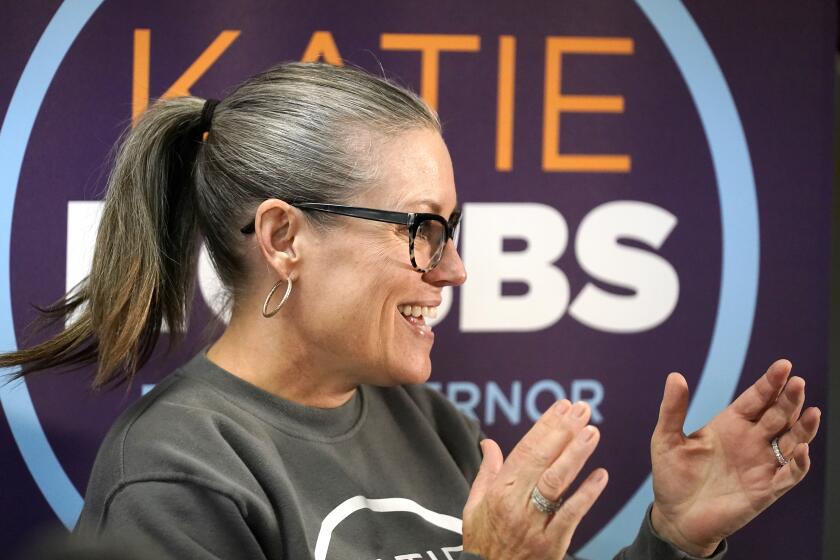Column: Biden as the comeback kid, Trump as the biggest loser: Takeaways from the midterm election

A red wave fails to materialize as the abortion issue boosts Democrats and Trump’s intervention costs Republicans in several races.
- Share via
When Republicans lost control of the House and Senate in 2006, a humbled President George W. Bush described it as a “thumping.”
Four years later, a chagrined President Obama referred to Democrats’ loss of 63 House seats as a “shellacking.”
By contrast, what happened in Tuesday’s startling midterm election was more like a slap on the wrist.
It seems likely Republicans will take the majority in the House, a significant achievement that will circumscribe President Biden and his fellow Democrats for the rest of Biden’s term.
But the result is far from the sort of epic victory the GOP — and many Democrats — had expected. Control of the Senate remains too close to call, as votes are counted in Arizona and Nevada and the Senate race in Georgia heads to a December runoff.
Here are some takeaways from an election — and you knew some watery metaphor was coming — that proved to be more of a small eddy than a Republican tidal wave.
Watch late-night hosts Stephen Colbert, Jimmy Kimmel and Trevor Noah break down the U.S. midterm election results.
The comeback kid
Biden may well be the most underestimated politician of our time.
He was left for dead in the 2020 Democratic nominating fight after several cringeworthy debate moments and losses in the first three contests.
His legislative agenda seemed permanently, embarrassingly stalled until Democrats resuscitated a massive infrastructure spending bill and passed it this summer.
Now Biden has managed to defy history and a number of fundamentals — widespread economic anxiety, a middling approval rating, the chance for cranky voters to vent — that seemed to portend a very bleak Tuesday.
It turns out those warning lights weren’t flashing red after all.
Republicans who backed Trump’s efforts to overturn the 2020 election lose key races for positions in which they would have overseen elections. But in some areas, they’re poised to win.
The modern average is a loss of 27 House seats in a president’s first midterm election. Based on various models, Vanderbilt University political scientist John Sides said Democratic losses should be in the 40-to-45-seat range — though he noted that several factors, among them a limited number of competitive seats, made that outcome highly improbable.
The GOP won’t come remotely close to any of those numbers — much less the 60-seat gain a giddy Republican House leader Kevin McCarthy spoke of last year after the party captured the governor’s seat in Democratic-leaning Virginia.
Biden, looking and sounding every bit his age at 79, inspires more trepidation than excitement among Democrats looking ahead to the 2024 presidential race and his apparent plans to seek reelection.
But this election shows, again, why you can’t write Biden off.
The biggest loser
Tuesday may have been the worst day, politically, for former President Trump since October 2016, when a video surfaced of him boasting on “Access Hollywood” about sexually mauling women. (Though he survived the scandal, it was dicey for a time.)
If Republicans fail to win control of the Senate, much of the blame will rest on the petulant ex-president.
He singularly promoted the quack TV doctor Mehmet Oz, whose defeat in Pennsylvania by John Fetterman was a crucial Democratic pickup.
Others Trump elevated — Blake Masters in Arizona, Herschel Walker in Georgia, Adam Laxalt in Nevada — thrilled the MAGA base but proved off-putting to many independents and to more-moderate Republicans. Better candidates would almost surely have won those contests.
Adding to the wreckage, Trump-backed or Trump-emulating candidates also lost races for the U.S. Senate in New Hampshire and for governor in Michigan and Pennsylvania, as well as winnable House contests in New Hampshire and South Carolina.
Worse for Trump as he prepares to announce his 2024 candidacy next week, his chief rival for the Republican nomination, Florida Gov. Ron DeSantis, scored a crushing reelection victory that further enhanced his image and political credentials.
Impeachment and insurrection are one thing. Losing elections is quite another. Trump’s power has always been tied to his perceived clout.
As that wanes, so too may his command over the GOP.
Former President Trump’s dominant role may have cost the Republican Party in the midterm elections, but he’s unlikely to walk away quietly.
The Roe vs. Wade decision
Abortion was a crucial issue that proved an anchor on Republicans.
There were signs over the summer, after the Supreme Court overturned Roe vs. Wade’s constitutional right to abortion, that the decision had greatly energized Democrats and women concerned about abortion access.
Conservative-leaning Kansas rejected an antiabortion referendum, and Democratic turnout surged in several special House elections.
The issue seemed to fade — at least in the attention it received from the media — as Republicans flooded the airwaves with advertising focused on crime and inflation. But exit polls suggest concerns about abortion access had not receded with voters.
About 3 in 10 of those surveyed by Edison Research said inflation was the most important issue affecting their vote, and about 7 in 10 of that group cast ballots for Republicans.
But nearly as many voters cited abortion as their most important issue, and they backed Democrats by an even greater margin.
The Republican Party’s vaunted red wave turned into a ‘red wedding.’ And it’s their own fault.
The issue helped lift Democratic gubernatorial candidates to victory in Wisconsin and Pennsylvania and helped Michigan Democrats hold on to the governor’s office and seize control of the Legislature.
Voters in Michigan as well as California and Vermont passed laws enshrining abortion rights in their constitutions.
Kentucky rejected a measure that would have outlawed the procedure, and a restrictive measure was also trailing in Montana.
A good night for democracy
A number of election deniers, who had toadied to Trump by repeating his lies about the 2020 campaign, went down to deserved defeat.
That included gubernatorial hopefuls in Wisconsin and Minnesota and several candidates for secretary of state, who had hoped to hijack the election machinery in such battleground states as Michigan and Pennsylvania.
Other would-be election saboteurs were trailing in the swing states of Nevada and Arizona, where GOP gubernatorial hopeful Kari Lake continued making false claims even as votes were being counted in her neck-and-neck contest with Democrat Katie Hobbs.
“We had a big day today, and don’t let those cheaters and crooks think anything different,” Lake told supporters in Scottsdale, Ariz., underscoring the odious nature of her campaign. “Don’t let them put doubt in you.”
The outcome is good news, in the short term. Much depends on the result once all the ballots are counted — and whether losing candidates concede defeat and abide by the will of voters.
Harvard government professor Ryan Enos warned against pivoting “toward the take that those who spoke out against antidemocratic forces were alarmist.”
“Democracy,” as he wrote on Twitter, “must be jealousy guarded.”
Nobody knows anything
It was another bad night for pundits and prognosticators.
The narrative of the last few weeks, and especially the final days, proved wildly unfounded. Anyone following the political news was primed for a Democratic debacle spelled in garish shades of Republican red.
Which just goes to show no one ever really knows what will happen.
And that is why, as they say in sports, you need to play the game.
And why, when it comes to elections, you need to vote.
More to Read
Get the latest from Mark Z. Barabak
Focusing on politics out West, from the Golden Gate to the U.S. Capitol.
You may occasionally receive promotional content from the Los Angeles Times.















